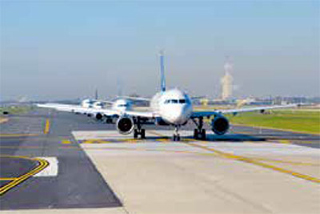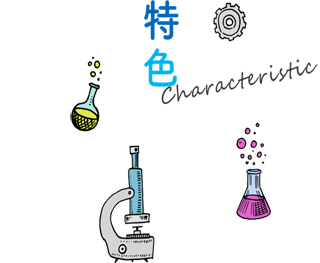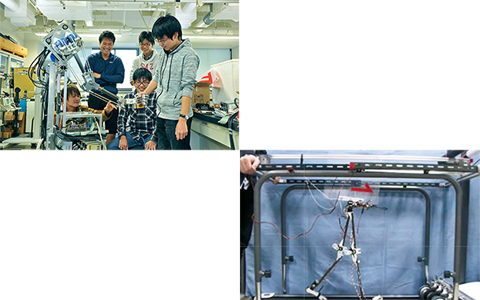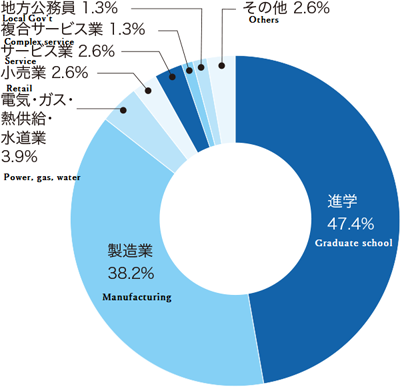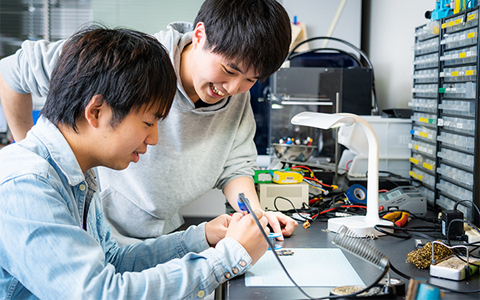Intelligent systems
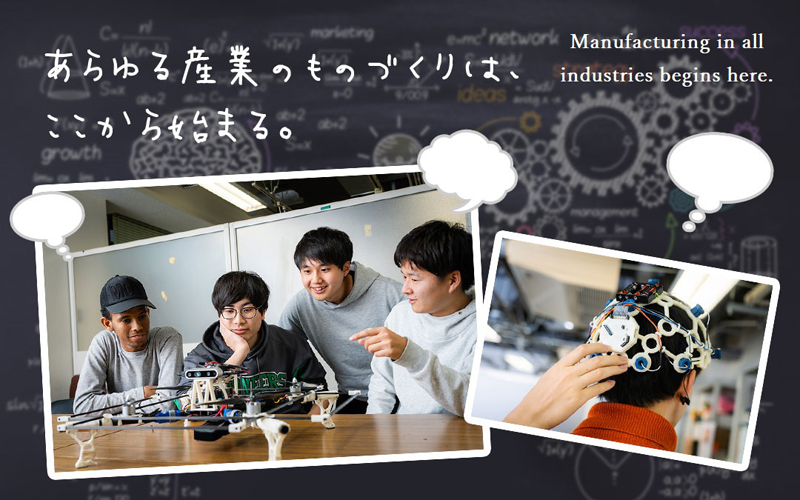
Engineering in our life: Airplane technology
|
Why do airplanes fly?
It is because their wings generate lift.
In fluid mechanics you will learn the “why”.
The lift requires force which overcomes drag and moves the airplane forward.
In thermodynamics you will learn about powered engines.
In order to carry a lot of people and luggage safely, we need to design a sturdy and light aircraft.
In strength of materials, you learn about unbreakable structures by calculating forces.
And, in order to fly around freely, each part, such as a rudder, should be appropriately manipulated to maneuver the airplane;
you will learn about a mechanism and methods to control it in control engineering and dynamics of machinery.
Also you will learn how to design and integrate parts of the airplane.
Airplanes are a cluster of mechanical technology. |
|
|
Let's create manufacturing in the future through robotics and control engineering.
In the modern manufacturing field, IT and artificial intelligence technologies are fused with
traditional mechanical engineering to develop into intelligent "smart manufacturing".
As a result, many household products and industrial equipment become compositions of
mechanical parts and computers.
In the Intelligent Systems Course, you will learn how to create intelligent "things"
while clarifying mechanisms of "things" using principles of physics such as mechanics.
Since the intelligent system science is the foundation of "manufacturing",
it covers various fields and contributes to various industries that support society:
robots, welfare equipment, aerospace aircraft, automobiles, ships, medical equipment,
information equipment, home appliances, industrial plants, material science,
design/production systems, etc.
In addition, it is an indispensable discipline for the development of "smart manufacturing"
in the future industry as a whole, and there is no doubt that its importance will be increased.
|
|
2nd year
Applied Mathematics I/II,
Applied Mechanics,
Practice on Machine Work,
Strength of Materials I/II,
Exercise in Strength of Materials,
Thermodynamics I/II,
Exercise in Thermodynamics,
Materials Science and Engineering for Mechanical Engineer,
Structured Programming,
Practice on Computer-Aided Design,
Design of Machine Elements,
Robot Kinematics,
Applied Manufacturing,
Dynamics of Machinery I,
Exercise in Dynamics of Machinery,
Fluid Mechanics I,
Exercise in Fluid Mechanics,
Introduction to Electrical and Electronic Engineering,
Sequence Control
3rd year
Exercise in Heat Transfer,
Corporate ethics,
Dynamics of Machinery II,
Industrial Economic Theory,
Control Engineering,
Exercise in Control Engineering,
Design and Drafting,
Heat Transfer,
Fluid Mechanics II,
Internship,
Intelligent Systems Science Laboratory*1,
Intellectual property rights,
English for Mechanical Engineering,
Seminar for Career Development,
Mechatronics / Artificial Intelligence,
Robotics & Bioengineering*2,
Control / Welfare Engineering,
Fluid Engineering,
Introduction to Ship Performance,
Introduction to Ocean Engineering
*1 “Intelligent Systems Science
Laboratory” is offered only in the Intelligent Systems Course.
*2 In the Intelligent Systems Course, you can take “Robotics & Bioengineering” from the third grade.
4th year
Energy System Engineering,
Factory Management,
Graduation Research

Students in both the Mechanical Engineering Course and the Intelligent Systems Course can take common
employment support.
There are job offers from 750 companies for about 50 applicants in both courses,
and the job openings-to-applicants ratio always exceeds 15 times.
Most of the employment destinations are manufacturing, e.g. automobiles, heavy industries,
shipbuilding, electric machinery, steel, machinery.
And energy-related services such as electric power and gas.
There are also jobs in government's technical workers, telecommunications business, transportation industries, etc.
You also have the opportunity to pursue a teaching career at an industrial high school.
As mentioned above, you can get your job with various possibilities.
With the recent increasing importance of a graduate school, the number of graduate students is increasing year by year.
In the last two years, more than half of the students are enrolled at our graduate school,
aiming to acquire advanced and specialized abilities in mechanical engineering. |
Career Status in FY2017 (as of May 1, 2018)
|
|
|
We are carrying out research on automation and intelligence in various machines by
incorporating computers and advanced control algorithms.
We are also analyzing the characteristics of machines' gentle movements for the person
to develop intelligent machines that coexist with and support humans.
Furthermore, we address applications of artificial intelligence to medical care and welfare,
development of efficient bipedal walking algorithms, autonomous driving of robots and
drones using artificial intelligence, automatic recognition of pointing gestures, etc.
They are necessary for intelligent machines such as robots in the future to support humans in various situations.

